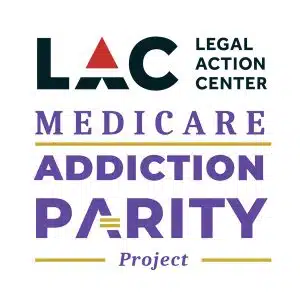Join Us Live for a Discussion on Medicare, Democracy, and the Future of Health Care
New Studies on Access to Mental Health and Substance Use Disorder Care Highlight the Need for Parity in Medicare

This article was written in coordination with the Center for Medicare Advocacy and the Legal Action Center.
As our country continues to face a mental health crisis and overdose epidemic, increasing access to mental health and substance use disorder treatment must be a significant priority for policymakers, patients, providers, and advocates. These conditions are prevalent among adults 65 years and older, with an estimated 6.5 million experiencing a mental illness and 4.3 million experiencing a substance use disorder in 2021. The prevalence of substance use disorders is about 4 times higher for Medicare beneficiaries under the age of 65 compared to those 65 years and older.
However, recent research suggests that coverage of these conditions is abysmal in Medicare Advantage plans, the private companies that manage the federal insurance program for more than half of the eligible older adults and people with disabilities who are enrolled in Medicare.
A new study published in Health Affairs found that coverage of psychiatrists is particularly poor in Medicare Advantage. Nearly two-thirds of Medicare Advantage plans’ provider directories contained fewer than 25 percent of the psychiatrists in the plan’s service area, compared to 40 percent in Medicaid managed care and Affordable Care Act plans. The authors found that this high rate of “narrow” networks is much worse for mental health providers than those for medical conditions; only one-fifth of primary care and specialist Medicare Advantage networks fell into this category. Furthermore, in more than half of the counties for which data was available, there was not a single psychiatrist who participated in Medicare Advantage.
Notably, the true rate of access to psychiatrists in Medicare Advantage plans is likely to be much worse, because the data is based on reported provider directory data which often contain significant inaccuracies. The U.S. Senate Finance Committee conducted a secret shopper survey of Medicare Advantage plans this year, finding that more than 80 percent of mental health providers who were listed in the plans’ directories were either unreachable, not accepting new patients, or not in fact in-network. Committee staff were able to schedule an appointment only 18 percent of the time.
These results are especially troubling when combined with KFF’s recent review, which found that approximately 60 percent of enrollees in Medicare Advantage plans did not have any coverage of out-of-network outpatient mental health and substance use disorder services in 2022. Medicare rules require plans to cover out-of-network providers when necessary to provide all Medicare Part A and Part B benefits. Unfortunately, many beneficiaries are not aware of these rules and do not pursue this coverage, leaving them vulnerable to having to pay the full cost of treatment if they could not access an in-network provider. Even in plans with some out-of-network coverage, most enrollees still have to pay half of the cost for treatment when they receive mental health and substance use disorder care from an out-of-network provider. Medicare Advantage enrollees who can find in-network mental health and substance use disorder providers are subject to other significant burdensome requirements, with about 98 percent needing to get prior authorization from the plan for these services and 26 percent needing to get a referral, the KFF review shows.
These consistent research findings demonstrate an unacceptable gap in care for older adults and people with disabilities. Unlike Medicaid managed care and Affordable Care Act plans, Medicare is not subject to the Mental Health Parity and Addiction Equity Act, the anti-discrimination law that requires health insurance plans to offer mental health and substance use disorder benefits on par with medical benefits. Discriminatory standards contribute to the lack of providers. For example, clinical social workers are reimbursed at only 75 percent of the rate for physicians, even though medical non-physician practitioners are reimbursed at 85 percent. Congress only recently extended Medicare coverage to several significant mental health and substance use disorder practitioners, but these providers will be reimbursed at that same discriminatory rate. Furthermore, although the Centers for Medicare and Medicaid Services (CMS) set strong time and distance network adequacy standards for psychiatrists in Medicare Advantage plans, the agency recently finalized a rule that sets the appointment wait time standard for routine mental health and substance use disorder care at 30 business days, compared to the 10 business day standard adopted for Affordable Care Act plans and proposed for Medicaid managed care plans. This extended wait time will allow Medicare Advantage plans to have fewer mental health and substance use disorder providers in network and undermine access to care. Medicare also does not separately track access to substance use disorder providers. This means that Medicare Advantage beneficiaries may not have any access to such care, which would clearly violate the Parity Act if it were to apply to Medicare. Finally, Medicare does not cover most community-based substance use disorder facilities, which significantly limits both access to care and continuity of care for individuals as they transition to Medicare.
The Parity Act prevents health insurance plans from imposing non-comparable or more stringent network standards, including reimbursement rates, on mental health and substance use disorder benefits than those for medical benefits, among other treatment limitations and administrative burdens. And yet, because Medicare is not subject to this law, such inequitable standards remain, and beneficiaries pay the price as a result.
The Legal Action Center, Center for Medicare Advocacy, and Medicare Rights Center urge Congress to apply the Parity Act to Medicare and to authorize the full range of services, settings, and providers necessary to treat substance use disorders and mental health conditions.

Legal Action Center’s Medicare Addiction Parity Project was established in 2021 to improve access to substance use disorder (SUD) care in Medicare, the federal program that provides health insurance coverage to individuals ages 65 and older as well as younger individuals with long-term disabilities.

The Center for Medicare Advocacy is a national, nonprofit, non-partisan law organization that works to advance access to comprehensive Medicare coverage, health equity, and quality health care for older people and people with disabilities through legal analysis, education, and advocacy.
Show Comments
We welcome thoughtful, respectful discussion on our website. To maintain a safe and constructive environment, comments that include profanity or violent, threatening language will be hidden. We may ban commentors who repeatedly cross these guidelines.
Help Us Protect & Strengthen Medicare
Donate today and make a lasting impact
More than 67 million people rely on Medicare—but many still face barriers to the care they need. With your support, we provide free, unbiased help to people navigating Medicare and work across the country with federal and state advocates to protect Medicare’s future and address the needs of those it serves.
The Latest
Most Read
Add Medicare to Your Inbox
Sign up to receive Medicare news, policy developments, and other useful updates from the Medicare Rights.
View this profile on InstagramMedicare Rights Center (@medicarerights) • Instagram photos and videos









